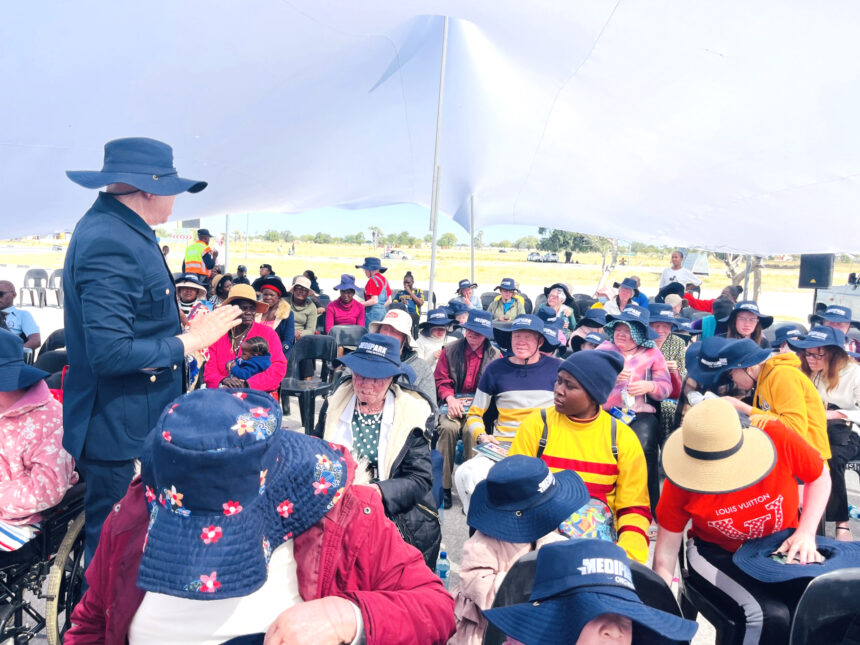NKURENKURU – Kavango West governor Verna Sinimbo says people with albinism should not be limited by their condition but must have a sense of belonging to the community, where they have equal rights like everyone else.
She said albinism is just a rare and beautiful genetic condition.
Sinimbo was speaking at this year’s World Albinism Day which was, for the first time, commemorated in Nkurenkuru on Friday under the theme: ‘Demanding our Rights: Protect our Skin, Preserve our Lives’.
International Albinism Awareness Day is commemorated annually on 13 June. Characterised by a lack of pigmentation in the skin, hair and eyes people with albinism often display incredible resilience, strength and grace. Many have risen to become leaders, educators, parents and role models in their communities.
According to the 2023 Household Census, approximately 38 000 Namibians are living with albinism, with a significant number residing in rural areas. While this may seem like a small fraction, each life matters, and each individual brings immense value to society.
“You are not defined by your condition, but by your dreams, your determination, and your humanity. I commend your perseverance, and I want you to know that you are seen, you are loved, and you are deeply appreciated,’’ Sinimbo noted.
She said the government remains committed to upholding and defending the rights of all its people and the country’s constitution demands that Namibians strive for equality, dignity, and inclusion despite physical traits or health-related needs.
“Today marks a historic moment for us in Kavango West, as it is the very first time this important day is being observed in our region. We gather not only to raise awareness, but also to celebrate the lives, dignity, and contributions of our fellow Namibians living with albinism,’’ she said.
Sinimbo noted that Namibia, guided by the principles of human rights and equality, recognises the importance of ensuring everyone, regardless of differences, is embraced, protected and empowered.
“This commitment is at the heart of observing this day. The United Nations General Assembly, on 18 December 2014, proclaimed 13 June as International Albinism Awareness Day, a global call to action to promote and protect the rights of people with albinism and amplify their voices in society,’’ she noted.
While people with albinism may experience unique challenges, they must not approach these with sorrow, but with compassion, understanding, and collective responsibility, Sinibo said.
“Among challenges faced by people living with albinism are high sensitivity to sunlight, which calls for broader access to sun protection and public awareness, visual impairments that can be supported through inclusive education and accessible services. A need for increased understanding and acceptance in some communities. Barriers to economic opportunities, which we must work to remove through empowerment, education and employment inclusion,’’ she added.
The governor said it is every citizen’s shared responsibility to ensure that every Namibian is given the opportunity to thrive in an environment that recognises their worth and supports their wellbeing.
The Ministry of Health and Social Services recently conducted a four-day outreach in both Kavango West and East, with an objective to provide proactive skin screenings for individuals with albinism to ensure timely medical support and improved health outcomes.
Namibia classifies albinism as a condition that qualifies for disability support in practice, in recognition of their unique healthcare needs. This ensures access to essential items like sunscreen and protective clothing, and tailoring services to suit their needs.
Sinimbo urged Namibians to unite in advancing the wellbeing and inclusion of persons with albinism and all persons with disabilities.
Jakko Haiyambo, a final year education student at IUM, said growing up was difficult for him to fit in. He said people with albinism face numerous challenges, including health issues, discrimination, stigma and violence, habitually entrenched in delusions and harmful beliefs from an early age.
“My fellow Namibians living with albinism, let us accept who we are, and start living life normally because we only have one life. If you cry and feel like you don’t belong, you need to rule that out and move forward to achieve your goals, let us us help each other, let’s fit in and feel we belong to our communities, let us be us and do us,’’ he motivated.
In Ondangwa
Meanwhile, the vice president of the Namibian Association of People with Albinism Walde Kambabi, said the organisation appreciates government’s efforts to assisting them.
He was speaking during a simmilar event on albinism in Ondangwa last week.
“We acknowledge all the achievements of our government, and we also request it to extend the sunscreen and cream to the remote areas where some of our members reside. This will enable them to obtain these essential products near their villages and healthcare facilities,” he said.
Kambabi said the organisation has transformed the lives of people living with albinism and the nation continues to support the association.
He encouraged family members to treat people with albinism well and live with them in a dignified manner.
“I am calling on our stakeholders to hold hands with us, in an attempt to eliminate all stereotypes, stigma and all forms of discrimination in society,” he said.
Kambabi stressed that their mission is to create platforms for people with albinism as well as where they share ideas among themselves and the public about the recognition of their rights as well as to improve the harsh living condition of their members.
During the commemoration, Dr Paulina Munalye and Dr Hileni Nangolo from Oshakati Intermediate Hospital conducted medical screening on people living with albinism.
The initiative aims to promote early detection and prevention of skin cancer among them.
Also speaking at the occasion, Eliaser Moses, an albinism activist, emphasised that being who they are is not a curse, but a blessing.
Moses described the day as a significant and meaningful occasion for all people with albinism.
Photo: Festus Hamalwa


